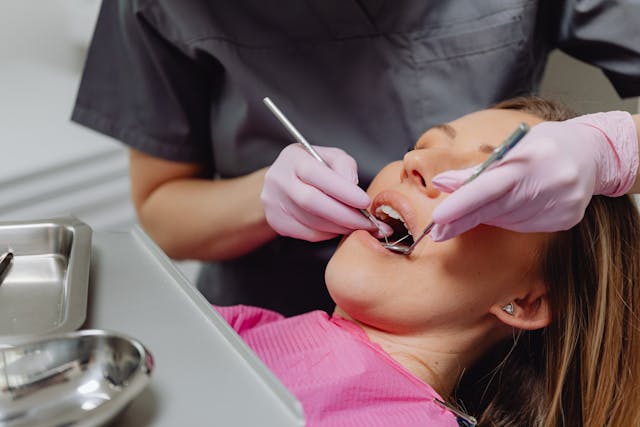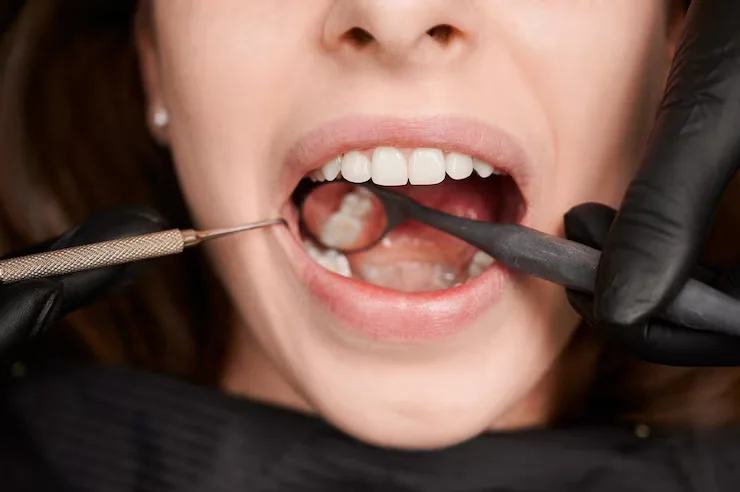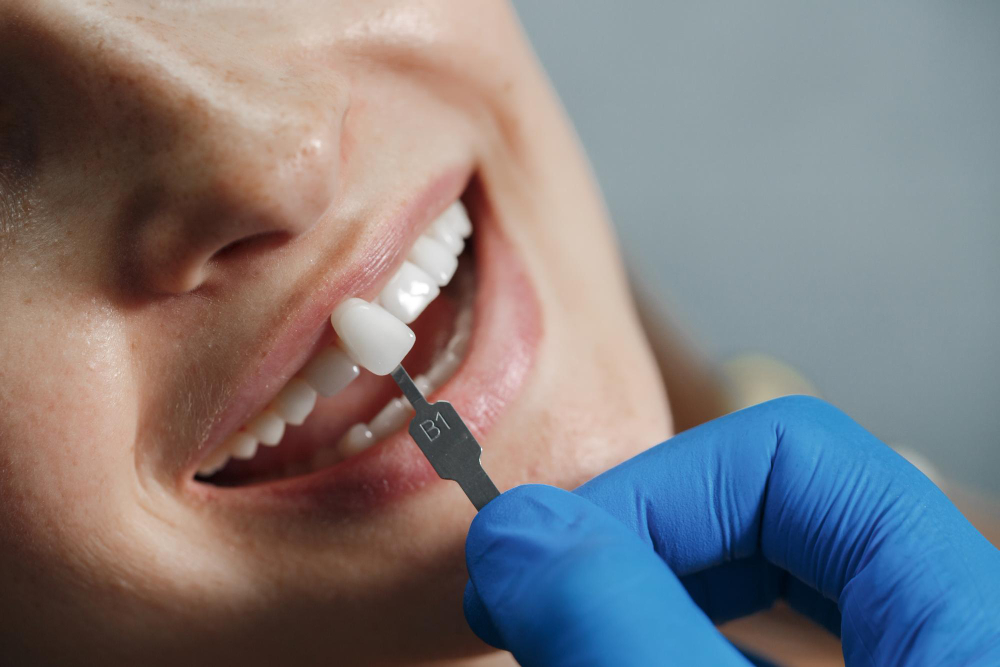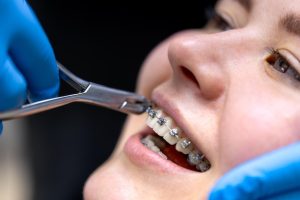TL;DR
- When pus is accumulated on a tooth, it is referred to as an abscessed tooth, and this is a painful condition caused by bacteria.
- Common indicators include a really intense toothache, swelling, as well as sensitivity.
- Some causes are untreated cavities, periodontal diseases, broken teeth, or poorly fitted dental work.
- Antibiotics, drainage, tooth extraction, or root canal therapy are generally used to facilitate the treatment process.
- Without treatment, complications can infect the jaw and bloodstream and lead to irreversible tooth loss.
- You need to see a dentist immediately in case of severe pain, swelling, or fever.
What is a Tooth Abscess?
A tooth abscess, also known as a dental abscess, is a serious infection that occurs when bacteria enter a damaged tooth or gum pocket. This leads to a build-up of pus, which causes intense pain and swelling. If left untreated, the infection can spread to surrounding tissues, including the jawbone, and become more difficult to manage. Unlike a simple cavity that affects only the tooth surface, an abscess indicates a deeper infection that needs urgent professional care.
This article will outline the common symptoms and causes of a tooth abscess, explain available treatment options, and guide you on when to see a dentist for an abscessed tooth.
What are the Common Symptoms of an Abscessed Tooth?
Early identification of the symptoms can help you seek prompt treatment. Typical symptoms include:
- Severe, throbbing toothache
- Sensitivity to hot or cold foods and drinks
- Swollen gums or facial puffiness
- Tender or enlarged lymph nodes in the neck or jaw
- Unpleasant taste or bad breath
- Fever and fatigue in more severe cases
In case you see the development of these symptoms, you should see a dentist for an abscessed tooth as soon as possible to prevent the progression of the disease.
Causes of a Tooth Abscess
A tooth abscess can develop due to several factors, including:
- Untreated Cavities: Ignoring cavities allows bacteria to penetrate deep into the tooth pulp, causing an infection that can lead to an abscess.
- Periodontal Disease: Gum infections provide a breeding ground for bacteria, which can eventually reach and infect the roots of the teeth.
- Damaged Tooth: Cracks or chips in a tooth create an entry point for bacteria, increasing the risk of infection.
- Previous Dental Work: Ill-fitted crowns, fillings, or other dental treatments can leave gaps where bacteria may accumulate, potentially resulting in an abscess.
Understanding the cause will help your doctor or dentist for abscess tooth to take on the right treatment.
How is a Tooth Abscess Diagnosed?
Our experts at Hopkins Family Dentistry recommend a thorough evaluation if a tooth abscess is suspected. To accurately diagnose the issue, they may:
- Check for Sensitivity: Light tapping or pressure on the tooth can reveal tenderness, often signalling an abscess at the root.
- Use Dental X-rays: X-rays help identify the abscess and show whether the infection has spread to nearby teeth or bone.
- Recommend Advanced Scans: If the infection may have extended beyond the jaw, a Computerized Tomography (CT) scan provides a detailed view of surrounding tissues in the neck, helping assess the severity.
How Dentists Treat an Abscessed Tooth?
Once an abscessed tooth is properly diagnosed, your dentist can determine the most effective treatment plan. Common treatment options include:
- Drainage: The dentist removes the pus and thoroughly cleans the infected area to prevent further complications.
- Antibiotics: When the infection has extended outside the tooth or there are chances of systemic infection, antibiotics are given to curb the bacteria causing the abscess. However, the abscess cannot be cured using antibiotics. It can merely assist in the management of the infection.
- Root Canal Therapy: In the cases of teeth that can be saved, a root canal treatment is carried out as a part of restorative dentistry. During this procedure, the dentist removes the infected pulp inside the tooth, cleans out the root canals, and seals them to stop the infection, all while keeping the natural tooth intact.
- Tooth Extraction: In instances of severe tooth damage that cannot be repaired, the tooth is extracted. This eliminates the cause of infection and avoids additional complications.
When to Go to the Dentist for a Tooth Abscess?
Visiting a dentist for an abscess tooth should be done immediately if you notice symptoms like severe pain, swelling, or fever. Failure to treat early may result in severe complications, such as:
- Transmission of infection to the jaw or bloodstream
- Permanent loss of teeth
- The likelihood of systemic health complications is higher

Conclusion
A tooth abscess is a serious dental issue that should never be ignored, as it can cause severe pain and potentially spread infection to other teeth or parts of the body. Prompt treatment not only relieves discomfort but also helps preserve the health and function of your smile.
If you notice symptoms, reach out to your trusted dentist for an abscessed tooth immediately. At Hopkins Family Dentistry, our team of experts combines advanced technology with compassionate care to provide effective solutions for every patient. Whether it involves drainage, root canal therapy, or other restorative treatments, we ensure safe and thorough management of your dental concerns.
Schedule an appointment now with a reliable dentist in hopkins and take the first step toward a healthier smile. You can call us at 952-935-2121 or visit our clinic at 1919 Main Street, Hopkins, MN 55343.
FAQs
1. What is a dental abscess, and how does it happen?
A dental abscess is a localized collection of pus caused by a bacterial infection in the tooth or surrounding gums. It usually develops when bacteria enter the tooth through untreated cavities, cracks, or injury, or when gum disease allows bacteria to infect the tissues around the teeth.
2. What are common symptoms of abscessed teeth?
Common signs of an abscessed tooth include intense, throbbing pain, swollen gums or facial areas, discomfort when chewing or touching the tooth, sensitivity to hot and cold foods or drinks, fever, and an unpleasant taste or bad breath from pus.
3. When should you get your tooth abscesses checked by a dentist?
You should visit your dentist in case of severe pain, fever, swelling, or any signs of infection.
4. What treatment can a dentist provide for a dental abscess?
Depending on the severity, treatment may include extraction, root canal treatments, drainage, and antibiotics.








